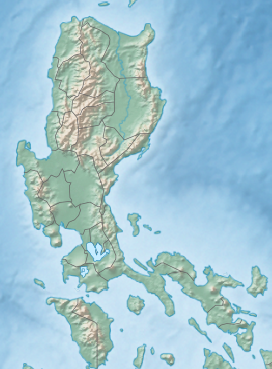|
Mount Data
Mount Data is a mountain located in the Cordillera Central mountain range rising to a height of 2,310 metres (7,580 ft) in the north of Luzon Island, Philippines.[2] It is about 100 kilometres (62 mi) north of Baguio on the borders of the provinces of Benguet and Mountain Province along the Halsema Highway.[3][4] The mountain and surrounding area has been declared a national park since 1936. In 1940 the park was expanded to 5,513 hectares (13,620 acres).[5][1] The slopes of the mountain are covered with pine forests and mossy oak forests.[4] The national park hosts five major rivers: the Chico, Ahin, Siffu, Abra, and Amburayan rivers. The Agno River also originates from Mount Data and flows through Benguet.[6] The reserve is also a watershed, which serves towns in Mountain Province, Buenget, and Ifugao.[7] The mountain is the site of the Mount Data Peace Accord of 1986 between the government of the Philippines and the Cordillera People's Liberation Army.[8] FaunaMount Data is formerly known for its great biological diversity and is a place that has long been in the attention of biologists. In 1895, the Englishman John Whitehead gathered a vast collection of mammals and birds from the mountain. This mammal collection was then donated to the British Museum. A research by zoologist Oldfield Thomas showed that many unknown species inhabit the area. Half a century later, a large collection of small mammals was collected by an expedition led by the Filipino biologist Dioscoro S. Rabor.[9] Some of these mammals are Carpomys melanurus (short-footed Luzon tree rat) and Carpomys phaeurus (white-bellied Luzon tree rat). In addition to several rare species of mammals, there are also some bird species like the Collocalia whiteheadi (Whitehead's swiftlet), which was only known then from a specimen that was caught during the expedition of John Whitehead on the mountain.[10] Carpomys melanurus (greater dwarf cloud rat) was first found on Mount Data in 1896.[11] See alsoReferences
External links
|
||||||||||||||||||||||||


